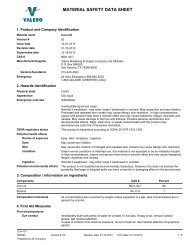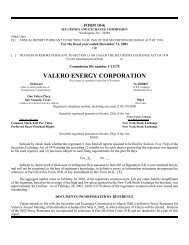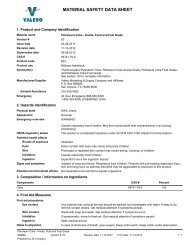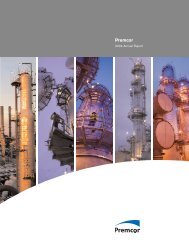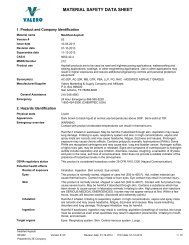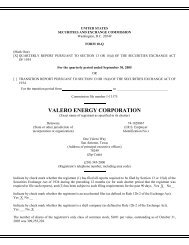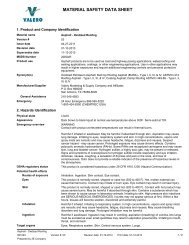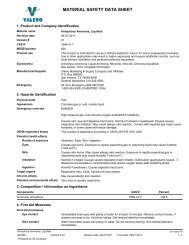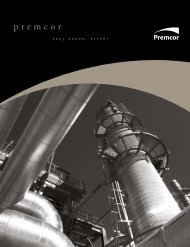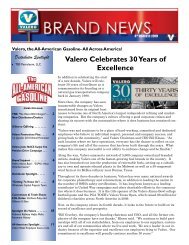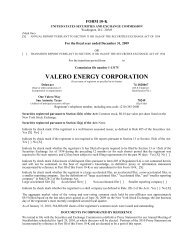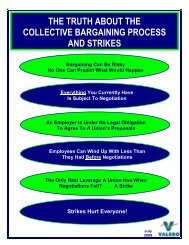Excellence Refined - 30 Years - Valero
Excellence Refined - 30 Years - Valero
Excellence Refined - 30 Years - Valero
You also want an ePaper? Increase the reach of your titles
YUMPU automatically turns print PDFs into web optimized ePapers that Google loves.
In its lifetime, <strong>Valero</strong> has invested $19.5 billion to improve its refineries. Since<br />
1997, <strong>Valero</strong> has spent $5.4 billion on regulatory and environmental compliance.<br />
The safety mission continues today. Since 2004, <strong>Valero</strong>’s<br />
refining system’s total recordable incident rate (TRIR)<br />
average of 0.89 per 200,000 working hours has beaten<br />
industry averages.<br />
Environmental excellence is not only<br />
good ethics, it’s also good business.<br />
——<br />
1996 <strong>Valero</strong> Summary Annual Report<br />
In the early 1980s, <strong>Valero</strong> recognized that a worldwide<br />
movement toward cleaner fuels was on the horizon.<br />
Long before most refineries sensed the move toward<br />
reformulated gasoline and emissions controls, the<br />
company was busy developing a strategy to meet<br />
those new demands. As the company has grown, it has<br />
remained at the forefront of this clean-fuels movement.<br />
Twenty-eight years after purchasing the property, <strong>Valero</strong>’s<br />
largest and most visible commitment to environmental<br />
stewardship is its Corpus Christi Refinery complex,<br />
renamed the Bill Greehey Refinery in 2006. <strong>Valero</strong> invested<br />
$535 million to construct a refinery that would take the<br />
lowest-grade feedstocks and turn them into premium,<br />
clean-burning fuels. The upgrade was no easy task, but<br />
by its completion in 1984, the refinery aptly produced a<br />
full slate of unleaded gasoline – years before it became<br />
a federal requirement to produce 100 percent unleaded<br />
fuel.<br />
The Clean Air Act of 1990 – at the time, the most allencompassing<br />
piece of legislation in U.S. history – became<br />
law with the hope of improving the nation’s air quality<br />
by tightening fuel specifications. The act mandated the<br />
use of cleaner-burning, “reformulated” gasoline (RFG) in<br />
the nation’s most polluted cities by 1995. But RFG had a<br />
higher oxygen content, which required dramatic changes<br />
to refining processes at significant costs to refiners.<br />
Because of its investments during the previous decade,<br />
however, <strong>Valero</strong> already was a leader in providing cleanerburning<br />
fuels, both in the U.S. and internationally. In<br />
February 1992, the company dedicated its $290 million<br />
Hydrocracker and Naphtha Reformer units at the Corpus<br />
Christi facility. More than 120 energy industry officials,<br />
dignitaries and media attended, taking tours of the plant<br />
and learning more about the project’s environmental<br />
importance. These units increased the company’s<br />
production of gasoline and gasoline-related products<br />
from 70 percent to 85 percent of total throughput. <strong>Years</strong><br />
later, <strong>Valero</strong> would become the first refiner outside the<br />
state of California to produce and supply California Air<br />
Resources Board (CARB) gasoline, a blend of gasoline<br />
that meets California’s stringent clean fuels standards.<br />
In the mid-1990s, <strong>Valero</strong> voluntarily added $40 million<br />
in additional environmental initiatives. A marine vapor<br />
recovery unit was added to capture vapors as gasoline<br />
was loaded onto ships and recycle them back into the<br />
refining process, equating to millions of gallons per<br />
year. A Belco scrubber was built to significantly reduce<br />
emissions – more than 40 percent below EPA standards –<br />
and became a staple at many of <strong>Valero</strong>’s refineries today.<br />
Such voluntary initiatives helped earn <strong>Valero</strong> the highest<br />
environmental award in Texas, the 1995 Governor’s<br />
Award for Environmental <strong>Excellence</strong>, presented by then-<br />
Texas Governor George W. Bush.<br />
The Houston and Texas City refineries acquired by <strong>Valero</strong><br />
in the Basis acquisition in 1997 were both “grandfathered”<br />
with regard to state environmental permitting laws.<br />
<strong>Valero</strong>, however, committed to dramatically reducing<br />
emissions from the plants anyway, by installing $60<br />
million in emission-control technology. The upgrades<br />
promised to reduce emissions from the two facilities<br />
Safety & Environmental<br />
40




